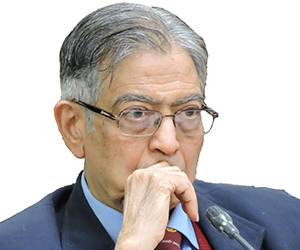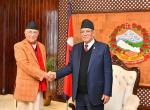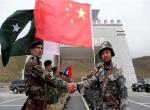It is ironical that at a time when Pakistan’s standing in the international community is down in the dumps its relationship with India is on the mend. While the rationale for the former is clear there is no such simple explanation for the latter.
The downward spiral in Pakistan’s standing in the international community is due to numerous factors notably its having been exposed as a source of terrorism, its role as a spoiler in finding a satisfactory resolution to the Afghan problem, its unsavoury record as a proliferator, and finally its emergence as a nation whose democratic credentials are suspect and where the observance of the rule of law is more the exception than the norm.
In contrast, there is no such linear logic to explain the upward trend in Pakistan’s relations with India as would seem to be case from the near euphoric statements being made in this regard from many sections, official and non official, in the latter. Have the perpetrators of the Mumbai attacks been brought to book by Pakistan? No. Instead terrorists like Hafiz Saeed are allowed to function freely and openly spew venom against India. Has Pakistan wound down the infrastructure of terror created by it for use against India? No. Indeed, after the Mumbai attacks of November 2008 there have been at least three other major Pakistani inspired terrorist attacks against India. Has Pakistan handed over to India any of the 50 or so terrorists elements like Dawood Ibrahim whose extradition had been requested by the latter? No. Has Pakistan stopped trying to push infiltrators into Kashmir? No. Has Pakistan shown any indication of genuinely seeking reconciliation with India by giving up its opposition to India’s quest for a permanent seat on the UN Security Council, by curbing the pumping in of fake currency into India or by desisting from pursuing an India centric nuclear policy? No. On the contrary it has encouraged the formation of the Defence of Pakistan Council led by extremists like Hafiz Saeed who revel in making aggressive anti Indian statements.
In the light of the foregoing it would be obvious to all objective analysts that there is no basic change of heart in Pakistan about India and that a new dawn in the relationship between the two countries is not on the cards in the foreseeable future. Indeed, given Pakistan’s continued involvement in terrorism directed against India another major terrorist incident in India is just waiting to happen.
Notwithstanding the foregoing many in India still insist on projecting a new found positivity in Pakistan’s attitude towards India on the basis of the very fact of Zardari’s April 8th visit to India, his call for “better relations”, Kayani’s subsequent assertion about the need for peaceful coexistence between the two countries and resolution of all issues, and Pakistan’s move towards according India MFN treatment. In this context, one may caution that it would be imprudent to be swayed by sweet nothings which is the sum and substance of Zardari’s India visit and the assertions made by Kayani and him. They by no means represent any tangible positivity on Pakistan’s stance vis a vis India and have merely been induced by the desire to ensure a peaceful eastern front at a time when Pakistan is under considerable pressure from the USA and has a troubled western front. It is, ofcourse, true that on trade Pakistan has made some forward movement by progressing from a positive list to a negative list though one should note that it is yet to accord MFN status to India. It must also be clearly understood that the halting moves taken by Pakistan in this regard are in part in response to our accord of MFN treatment to Pakistan way back in the 1990’s, and in part in response to our not having opposed the EU move to provide Pakistani textiles duty free access to the Eurozone even though this adversely affected our own textile exports. Finally, it should be kept in mind that by deciding to give India MFN treatment Pakistan is only doing itself a favour as its failure to do so all these years has denied it access to cheaper Indian goods---- something which is particularly painful at a time when its economy is in dire straits.
Clearly, projections of a change of heart in Pakistan vis a vis India are untenable. They are also unfortunate as they have created a totally misplaced euphoria about the possible upward trajectory of India-Pakistan relations and induced all manner of ill considered calls for further concessions by India to woo Pakistan even in disregard of all security implications. Such calls are gathering traction as our Prime Minister is all set to visit Pakistan within the next few months and a “successful” visit would demand the conclusion of some agreements.
Some of the agreements being touted are an easing of the visa regime, removal of existing restrictions on Pakistani investments in India, and settlement of the Sir Creek and Siachen issues. It is submitted that no such agreements should even be contemplated until and unless there is clear evidence that Pakistan is prepared to bring to book the perpetrators of the Mumbai attacks, shut down its India centric terrorist infrastructure and give up its inimical attitude towards India. Conclusion of such agreements in the absence of such evidence would not only amount to dishonouring the memories of the countless Indians who have been the victims of Pakistani inspired terror but would also embolden Pakistan to continue to involve itself in terrorist actions directed against India confident that the latter will never penalize it. Furthermore, it needs to borne in mind that even relatively innocuous measures like an easing of visa restrictions or removal of constraints on Pakistani investments in India will exponentially enhance Pakistan’s capabilities to destabilize India and should not, therefore, be considered as long as the former does not give up its inimical approach towards India. In this context, one need only refer to recent reports to the effect that Pakistan has been using the eased travel opportunities across the LOC for smuggling large amounts of fake currency into India.
Finally, as regards the proposed agreements on Sir Creek and Siachen the same will only be reached if India makes all the concessions. Historically, on no issue has Pakistan made any major concession and agreements between it and India have only been arrived at on when the latter has done all the running. Though the differences between the two countries on both issues are relatively small there is no reason for India to make any special gestures as long as Pakistan continues to give us no satisfaction on the issue of terrorism and retains its inimical mindset vis a vis India. This is all the more so as the special gestures made by India in the past as in the Indus Waters Treaty and in the Simla Agreement have earned it no gratitude or appreciation from Pakistan.
Both on Sir Creek and Siachen, though the differences between the two countries are relatively small they embody important issues of principle and there is no reason why India should make concessions and give in to the utterly unreasonable demands made by Pakistan.
Specifically, in respect of Sir Creek while India has taken the internationally accepted position that the boundary between the two counties should be the mid channel of the Creek, Pakistan demands that it should be the eastern shore line of the Creek. While acceptance by India of the Pakistani position would entail a marginal loss of territory on land it will have a much greater adverse impact in the determination of our maritime boundary and Extended Economic Zone. Accordingly, it would not be appropriate for us to give up our principled position on the issue. This is all the more so as the region is believed to be rich in hydrocarbons.
In respect of Siachen both sides have been calling for a demilitarization of the area and withdrawal of forces to specified points. It has, however, not been possible to arrive at an agreement as Pakistan has been unwilling to authenticate the existing location of the forces of the two sides. This is essential in order to be able to establish breach of faith by either side. Given Pakistan’s proclivity to violate such understandings with India, as most recently demonstrated by their breach of the LOC in 1999 which led to the Kargil conflict, it would be imprudent for us to give up our insistence on Pakistan’s authentication of the Actual Ground Position Line. Indeed, some may argue and rightly so that we should not pursue an agreement at all on this issue because when it was originally mooted in the 1980’s we were taking many casualties in the area which is not the case today due to vastly improved logistics. Furthermore, while we could, in the 1980’s and 1990’s, have addressed Pakistan’s stealthy occupation of the area, through a breach of faith, by bringing to bear our superiority in conventional arms this is much more difficult in the current nuclearised environment. Above all we should not lose sight of the fact that demilitarization of Siachen will enhance the possibility of Sino-Pak collusive activity in the area.
First published in Sunday Guardian on May 13, 2012; a modified version being published here courtesy Sunday Guardian









Post new comment